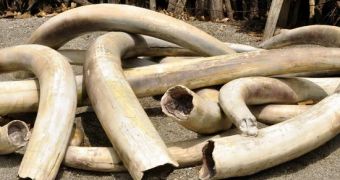This January 6, over six tons of ivory were destroyed during a public ceremony held in the city of Guangzhou, i.e. the capital of China's Guangdong province. The destruction of this ivory stockpile was announced by the Wildlife Conservation Society just a few days ago.
At that time, the organization explained that, much like the ivory crush that took place in the United States on November 14, 2013, the ceremony organized in China this Monday was intended to let poachers know that the country did not and would not ever tolerate wildlife crime.
Information shared with the public says that the six tons of ivory that China crushed this January 6 were made up of tusks and quite a lot of carvings.
The event was witnessed by representatives from 10 different countries, including states that are currently home to an elephant population, such as Kenya, Gabon, and Tanzania.
According to The Guardian, representatives of the United Kingdom were also present at the ceremony.
Just as the United States did back in November 2013, China got rid of these over six tons of ivory by feeding them into crushing machines. The machines turned the ivory into a fine powder and very small fragments.
As was to be expected, the move was welcomed by many green groups, including the Wildlife Conservation Society and the African Wildlife Foundation.
“This is a courageous and critical first step by China to elevate the important issue of wildlife trafficking and elephant poaching among its citizens and around the world,” the current Chief Executive of the African Wildlife Foundation, Patrick Bergin, said in a statement.
“The Chinese government is to be commended for taking the issue seriously,” he went on to argue.
However, some say that destroying this much ivory might not have been such a good idea. Thus, there are a few conservationists who say that, by crushing this ivory stockpile, China has achieved no more and no less than make this material harder to come by and therefore more expensive.
These people fear that, on the long run, this might lead to an increase in the number of elephant poaching cases reported in Africa on a yearly basis.

 14 DAY TRIAL //
14 DAY TRIAL //